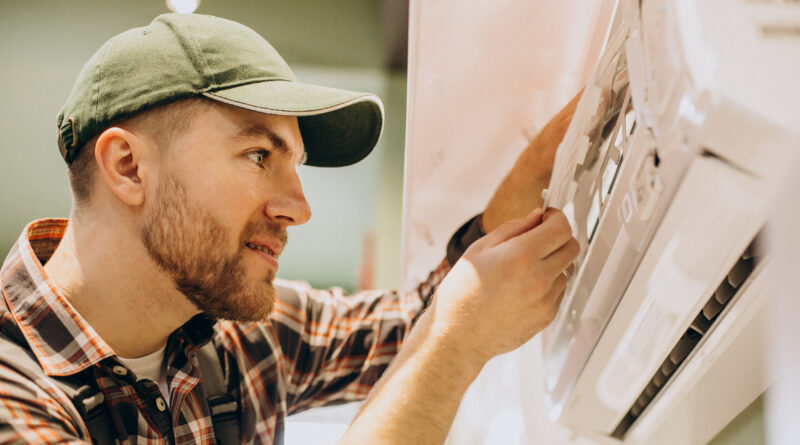Guidelines For AC Maintenance: Tips for a Cool Summer
Guidelines For AC Maintenance: Tips for a Cool Summer
Air conditioners play a vital role in maintaining the comfort of our homes and workplaces. Proper maintenance is crucial to ensure the longevity and efficiency of the unit. AC maintenance is an essential part of ensuring that your air conditioning unit is running efficiently and effectively. It involves regular inspections, cleaning, and repairs to ensure that the unit is in good working condition and that it is able to provide cool and comfortable air in your home or office. Without proper maintenance, your AC unit may experience problems that can lead to increased energy costs, reduced airflow, and even complete failure. To ensure that your AC unit is running smoothly, it is important to schedule regular maintenance appointments with a professional technician. This will not only help you save money on energy costs but also extend the lifespan of your unit.
In this article, we will discuss the important guidelines for air conditioner maintenance that will help you keep your unit running smoothly and efficiently.
Air Conditioner Maintenance Guidelines:
- Clean or Replace the Air Filter
The air filter is an important component of the air conditioner that helps to remove dust, dirt, and other contaminants from the air. It is recommended to clean or replace the air filter every 1-3 months, depending on the usage and the environment. A clogged air filter can reduce the efficiency of the unit and increase energy consumption.
2. Check the Refrigerant Level
The refrigerant is the fluid that is used to cool the air in the air conditioner. It is important to check the refrigerant level regularly to ensure that it is at the correct level. A low refrigerant level can cause the unit to work harder and increase energy consumption.
3. Clean the Coils
The coils of the air conditioner are responsible for removing heat from the air. It is important to clean the coils regularly to ensure that they are free of dirt and debris. A dirty coil can reduce the efficiency of the unit and increase energy consumption.
4. Check the Ducts
The ducts of the air conditioner are responsible for distributing the cooled air throughout the space. It is important to check the ducts regularly to ensure that they are free of leaks and blockages. Leaks and blockages can reduce the efficiency of the unit and increase energy consumption.
5. Inspect the Drain Line
The drain line of the air conditioner is responsible for removing excess moisture from the unit. It is important to inspect the drain line regularly to ensure that it is free of clogs and blockages. A clogged drain line can cause water damage and mold growth.
6. Check the Thermostat
The thermostat is the device that controls the temperature of the air conditioner. It is important to check the thermostat regularly to ensure that it is working properly. A faulty thermostat can cause the unit to work harder and increase energy consumption.
7. Inspect the Electrical Components
The electrical components of the air conditioner are responsible for powering the unit. It is important to inspect the electrical components regularly to ensure that they are in good working condition. A faulty electrical component can cause the unit to stop working or increase energy consumption.
8. Schedule Professional Maintenance
It is recommended to schedule professional maintenance at least once a year to ensure that the unit is running efficiently and to identify any potential issues before they become major problems. A professional technician can perform a thorough inspection of the unit and perform any necessary repairs or maintenance.
Other important points to remember for AC maintenance:
Regularly Check for Leaks: One of the most important guidelines for air conditioner maintenance is to regularly check for leaks. This can be done by inspecting the unit and checking for any signs of water or refrigerant leaks. If a leak is found, it is important to have it repaired immediately to prevent further damage to the unit and avoid costly repairs.
Properly Insulate the Unit: Another important guideline for air conditioner maintenance is to properly insulate the unit. This can be done by ensuring that the unit is located in a well-insulated area and that all ductwork is properly sealed. This will help to keep the unit running efficiently and prevent energy loss.
Keep the Unit Clear of Obstructions: Another important guideline for air conditioner maintenance is to keep the unit clear of obstructions. This includes making sure that there is adequate space around the unit for proper airflow and that there are no plants or other objects blocking the unit’s vents.
Use a Programmable Thermostat: A final important guideline for air conditioner maintenance is to use a programmable thermostat. This can help to control the temperature in your home and save energy by only running the unit when it is needed. A programmable thermostat can also be set to turn off the unit when no one is home, which can save energy and money.
Conclusion: Proper air conditioner maintenance is essential for ensuring the longevity and efficiency of the unit. By following the guidelines discussed in this article, you can help ensure that your air conditioner is running smoothly and efficiently. Remember to clean or replace the air filter, check the refrigerant level, clean the coils, check the ducts, inspect the drain line, check the thermostat, inspect the electrical components, and schedule professional maintenance. Regular maintenance will not only keep your unit running smoothly but also save you money on energy bills and costly repairs.

